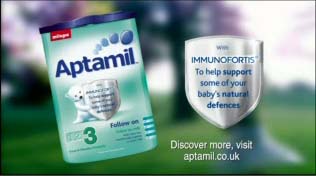Baby milk companies attack UK government recommendation to warn parents of formula risks
Press release 2 June 2008
The baby food industry in the UK has attacked a government recommendation that labels of powdered infant formula should carry warnings that the contents are not sterile and the simple steps required to reduce risks. Contamination with potentially harmful bacteria such as Enterobacter Sakazakii is surprisingly common (14% of tins infected in one study) and though resulting illness is rare, the consequencies can be serious as infants have died from meningitis linked to contamination in the past.
The industry's reluctance to warn parents is documented in papers just published by the Food Standards Agency (FSA) following a consultation on Guidance Notes to accompany new formula marketing regulations (see below). Health campaigners are concerned that as the recommendation is not legally binding, companies will continue to deny parents information that could reduce illness and even save lives. The industry has also attacked recommendations regarding how it advertises and promotes formula.
Mike Brady, Campaigns and Networking Coordinator at Baby Milk Action, said:
"The possibility that powdered formula may be contaminated with Enterobacter Sakazakii in the manufacturing process has been known about for years and the World Health Organisation and the UK Food Standards Agency and Department of Health have been doing their best to alert parents how to reduce the risks. It is a scandal that companies are not putting this information on labels and give every indication they will ignore the recommendation in the government's new Guidance Notes. The Government has promised to review the regulations during the first 12 months and we want to see stronger measures in this and other areas."
The risks of intrinsic contamination of powdered formula with harmful bacteria, such as Enterobacter Sakazakii came to public attention following the death of a 5-day-old child in Belgium in 2002 after being fed with Nestlé formula, which was then recalled across Europe. A study cited by the Food and Drug Adminstration in the US found 14% of tins sampled were contaminated with the bacteria. The FSA issued guidance to parents in November 2005, but no company has brought its warnings and instructions into line.
In its response to the Guidance Notes, the UK industry body, the Infant and Dietetic Food Association, opposed the recommendation that parents be warned powdered formula is not sterile and the need to mix up formula with water above 70 deg. C and discard unused formula. It stated:
"We do not support the alternative wording proposed in the guidance notes on the grounds that this may be alarmist and not easily understood by the consumer. Such a warning statement could lead consumers to use inappropriate products such as other powdered milk or other liquids (not infant or follow-on formulae) which do not have such warnings".
The FSA responded:
"FSA-funded focus group research found that caregivers were concerned that powder formula was not sterile. Overall, as it poses a potential risk to babies, parents and healthcare professionals agreed that information about non – sterility and what it means should be clearly communicated to parents, so that they can make informed decisions and choices."
LACORS, the umbrella body for Trading Standards, stated in its comments:
"LACORS assumes that the references to instructions for appropriate preparation will refer to the current DoH [Department of Health] recommendation that the minimum water temperature to prepare infant formula is 70 deg C. It would be desirable to add a further reference to the fact that instructions relating to lower temperature are totally unacceptable on the grounds of protecting infant health and well being."
Monitoring of company telephone carelines and formula labels conducted by Baby Milk Action has found that companies are failing to give correct information to parents and even directly contradicting the guidance to parents from the FSA and Department of Health.
A submission to the consultation by Baby Milk Action on behalf of the Baby Feeding Law Group, consisting of 22 health professional and mother support organisations, was backed by 434 individual responses and called for the 'recommendation' to include information on reducing risks to be stronger. The FSA responded to the BFLG:
"The Agency would like to see manufacturers providing consistent advice on preparation that fully takes into account the microbiological risks associated with these products and reflects the advice issued by Department of Health."
For further information
Contact Mike Brady using mikebrady@babymilkaction.org or on
020 3239 9222.
The industry has opposed other aspects of the Guidance Notes intended to put an end to some of its aggressive marketing practices. The FSA's summary of responses can be found here (responses to a follow up consultation can be found here). A summary of key points prepared by Baby Milk Action can be downloaded here.
Some examples are:
British Retail Consortium
"We are specifically concerned about paragraph 49 of the guidance which suggests that ‘shelf-talkers’ and other in-store promotional devices for follow-on formulae are not used in the vicinity of infant formulae. We are especially concerned about the unreasonable suggestion that a follow-on formula has to be located in a different part of the store to infant formula. This is gold plating, as this is not laid down in the legislation. As best practice this proposal is completely unjustified."
|
|
Unjustified?
The images, right, show how companies use claims that are illegal on infant formula to draw attention to the formula section of supermarkets, in this case, Tesco.
The claim 'with prebiotic care to support you baby's natural immune system' is illegal on infant formula (for use from birth). When a similar expression was used in an advertisement for follow-on formula (for use from 6 months), the Advertising Standards Authority investigated and found it was not substantiated by scientific evidence.
Click on the images for larger versions. |
|
Advertising Association
"The call for advertisers to submit planned campaigns to the FSA in advance of their implementation seems unnecessary, especially since this service is already available to the industry via its own self-regulatory bodies."
However, one of those self-regulatory bodies, the Advertising Standards Authority (ASA), said in its submission:
"The FSA’s interpretation of an advertisement is broader than the Advertising Codes, the ASA has no role in maintaining standards in these areas."
The ASA has refused to even investigate most of the cases of aggressive marketing reported to it by Baby Milk Action. |

A current television and internet advertisement for Aptamil follow-on formula - "inspired by breastmilk" - implies it provides protection against infection, similar to breastfeeding.

|
The Baby Feeding Law Group called for an outright ban on the advertising of infant formula, in line with international standards adopted by the World Health Assembly and introduced in many other countries. The FSA responded:
"The provision at Regulation 22 addresses concerns that advertising of follow on formula could be taken as advertising for infant formula and undermine breastfeeding. The independently chaired review of the new controls will assess whether this has been effective and if not we’ll consider if further action needs to be taken."
This misses the point that breastfeeding is recommended by the World Health Organisation and the Department of Health beyond six months and is undermined by this aggressive marketing of follow-on milks. |
Hipp
"Does the approval of the Secretary of State need to be sought for all existing informational and educational equipment and materials or just for all new materials?"
The FSA pointed out this is not a new requirement, but was included in the 1995 version of the regulations! |
|
Clearly Hipp did not gain the required authorisation for materials such as the 'record book' given free to parents registering the birth of their children in some cities. In addition, the regulations do not allow materials, when authorised, to be distributed outside the health care system.
Gifts such as Hipp's sticker book encourage parents to contact the company for information on infant feeding. The Guidance Notes make it clear this should not be used as a back door way to promote formula direct to these parents. Hipp seems to find this challenging, stating:
"We feel more guidance is needed than has been given in this draft as this is an area where there is a risk of misinterpretation or differing interpretation by different interested parties. For example, does ‘private correspondence’ and ‘oral communications’ mean that feeding information that has been requested by the customer in these contexts must not include any specific product information that might encourage the customer to use one product over any other?"
Infant and Dietetic Foods Association
As well as challenging the recommendation to warn parents that powdered formula is not sterile, the industry body challenges other aspects of the regulations. For example, young babies are sometimes used in promotion that is ostensibly for follow-on milk and the Guidance Notes suggest that babies pictured should be clearly above six months of age.
"Perception of babies under six months of age is very subjective. Manufacturers always ensure the babies are over the chronological age of six months."
As well as showing an apparently young baby (though the small print says it is 8 months), this advertisement should not be repeated as it draws equivalence with breastfeeding. |
|
Notes for editors
-
The UK has breastfeeding rates amongst the lowest in the industrialised world. Despite government commitments to improve breastfeeding rates there has been little change, with initiation rates of just 76%, meaning a quarter of infants receive no breastmilk at all. Breastfeeding rates then decline rapidly as the promotion exposed in Baby Milk Action’s recently launched Hard Sell Formula pamphlet undermines breastfeeding and encourages mothers to use formula. In the UK few infants are breastfed at 6 months. Government figures show just 48% are breastfed at 6 WEEKS. According to government figures, 90% of mothers who stopped breastfeeding at 6 weeks said they wanted to breastfeed for longer, as did 40% of mothers who breastfed for 6 months.
-
The UK Baby Feeding Law Group is an adhoc group of health professional and lay organizations working to bring UK and EU legislation into line with the International Code of Marketing of Breastmilk Substitutes and subsequent relevant WHA resolutions. Its members are: The Association of Breastfeeding Mothers, the Association for Improvements in the Maternity Services, the Association of Radical Midwives, Baby Milk Action, the Breastfeeding Network, the Food Commission, the Community Practitioners and Health Visitors’ Association, Lactation Consultants of Great Britain, La Leche League (GB), Little Angels, Midwives Information and Resource Service, the National Childbirth Trust, the Royal College of Midwives, the Royal College of Nursing, the Royal College of Paediatrics and Child Health and the Unicef UK Baby Friendly Initiative.
-
In its Public Health White Paper, Choosing Health, the Government stated: “Further action will include the review of the Infant Formula and Follow-on Formula Regulations (1995) with a view to further restrict the advertising of infant formula. We will continue to press for amendments to the EU Directive on infant formula and follow-on formula.” While the Government did push for changes to the EU Directive, its efforts largely failed. However, legal experts agree that the Directive does not prevent the Government taking action to protect health by introducing World Health Assembly marketing requirements in UK law. The Baby Feeding Law Group submitted the report which submitted the report Protecting breastfeeding - Protecting babies fed on formula to the consultation.
- Baby Feeding Law Group members are also members of the Breastfeeding Manifesto Coalition, which is calling for action in 7 areas to protect, promote and support breastfeeding.
|



